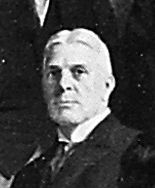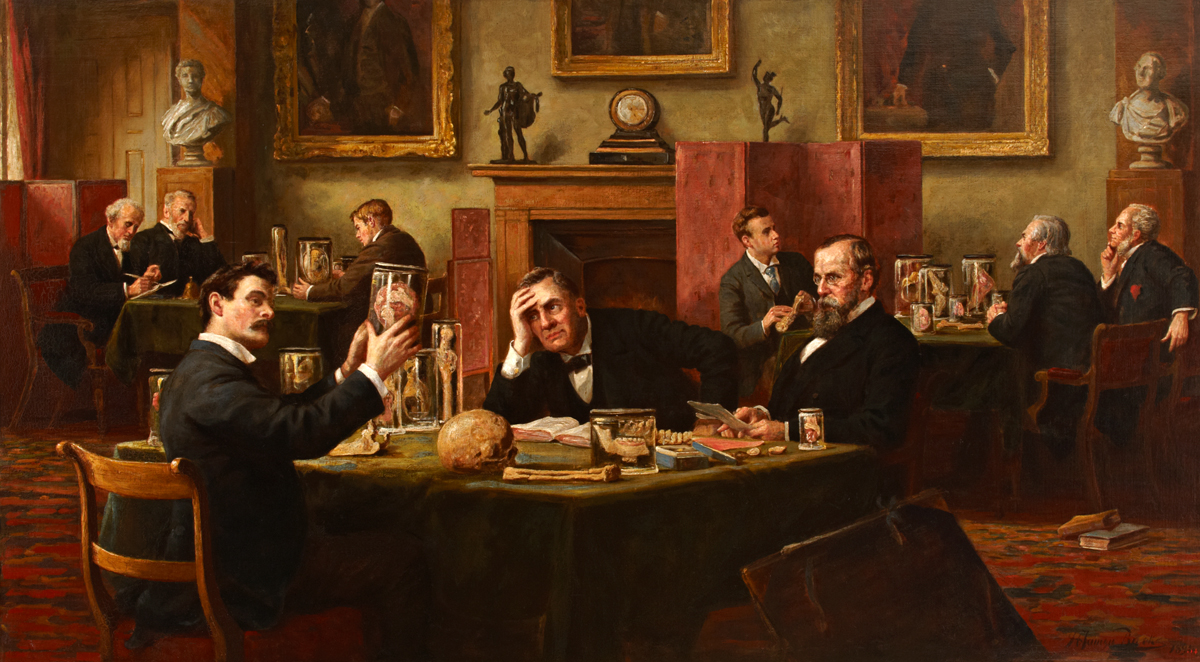|
Holburt Jacob Waring
Sir Holburt Jacob Waring, 1st Baronet, CBE, FRCS (3 October 1866 – 10 February 1953) was a surgeon at St Bartholomew's Hospital, London and was vice-chancellor of the University of London from 1922 to 1924. Early life He was born in Chorley, Lancashire, the eldest son of Isaac Waring, a schoolmaster, and his wife, Catherine Holburt. He attended Owen's College, Manchester, (now the University of Manchester) and gained a BSc in physiology (1888), an MB (1890) in medicine and forensic medicine, a BS (1891) and MS in 1893. He became FRCS in 1891. Career He was demonstrator of anatomy and teacher of surgery at St Bartholomews and rose to become consulting surgeon. During the First World War he was a colonel in the Royal Army Medical Corps and consulting surgeon in addition to his hospital work. He was an officer of the Légion d'honneur. He represented the Faculty of Medicine in the Senate of the University of London and in 1920 he was elected dean of the Faculty of Medicine ... [...More Info...] [...Related Items...] OR: [Wikipedia] [Google] [Baidu] |
Faculty Of Medicine
A medical school is a tertiary educational institution, or part of such an institution, that teaches medicine, and awards a professional degree for physicians. Such medical degrees include the Bachelor of Medicine, Bachelor of Surgery (MBBS, MBChB, MBBCh, BMBS), Master of Medicine (MM, MMed), Doctor of Medicine (MD), or Doctor of Osteopathic Medicine (DO). Many medical schools offer additional degrees, such as a Doctor of Philosophy (PhD), master's degree (MSc) or other post-secondary education. Medical schools can also carry out medical research and operate teaching hospitals. Around the world, criteria, structure, teaching methodology, and nature of medical programs offered at medical schools vary considerably. Medical schools are often highly competitive, using standardized entrance examinations, as well as grade point averages and leadership roles, to narrow the selection criteria for candidates. In most countries, the study of medicine is completed as an undergraduate ... [...More Info...] [...Related Items...] OR: [Wikipedia] [Google] [Baidu] |
1866 Births
Events January–March * January 1 ** Fisk University, a historically black university, is established in Nashville, Tennessee. ** The last issue of the abolitionist magazine '' The Liberator'' is published. * January 6 – Ottoman troops clash with supporters of Maronite leader Youssef Bey Karam, at St. Doumit in Lebanon; the Ottomans are defeated. * January 12 ** The '' Royal Aeronautical Society'' is formed as ''The Aeronautical Society of Great Britain'' in London, the world's oldest such society. ** British auxiliary steamer sinks in a storm in the Bay of Biscay, on passage from the Thames to Australia, with the loss of 244 people, and only 19 survivors. * January 18 – Wesley College, Melbourne, is established. * January 26 – Volcanic eruption in the Santorini caldera begins. * February 7 – Battle of Abtao: A Spanish naval squadron fights a combined Peruvian-Chilean fleet, at the island of Abtao, in the Chiloé Archipelago of southern Chile. * Februar ... [...More Info...] [...Related Items...] OR: [Wikipedia] [Google] [Baidu] |
Ernest Arthur Gardner
Ernest Arthur Gardner (16 March 186227 November 1939) was an English archaeologist. He was the director of the British School at Athens between 1887 and 1895. Early life Gardner was born in Clapton, London, England on 16 March 1862 to Thomas Gardner and Ann Pearse. He was educated at the City of London School, a boys' independent day school located in the City of London. He entered Gonville and Caius College, Cambridge in 1880. He read for a Bachelor of Arts (BA) in Classics and graduated with a double first in 1884. Career Early academic career Gardner became a fellow of Gonville and Caius College in 1885. In 1885 and 1886, as part of the Egypt Exploration Society, he was involved in the excavations at Naucratis, Egypt. He became a student of the British School at Athens under Francis Penrose in 1886. From 1887 to 1895 he was director of the school. During his first term as director, he led excavations at Old Paphos and Salamis in Cyprus. When his directorship was e ... [...More Info...] [...Related Items...] OR: [Wikipedia] [Google] [Baidu] |
Sydney Russell-Wells
Sir Sydney Russell-Wells, FRCP (25 September 1869 – 14 July 1924) was a British physician and politician. He served as Member of Parliament for London University from 1922 until 1924, as a Unionist. Early life He was born in London and attended Dorset County School. He graduated from University College London with a BSc in 1889 and then studied medicine at St George's Hospital. Career Medicine He was House Surgeon, House Physician and Registrar at St George's Hospital, then based at Hyde Park Corner in central London. He was then physician at the Seaman's Hospital, Greenwich and later at the National Hospital for Diseases of the Heart. He was Vice Chancellor of the University of London from 1919 to 1922. Politics He served as Member of Parliament for London University from 1922 until 1924, sitting as a Unionist. Honours In 1921, he was appointed Knight Bachelor (Kt).The Times, Saturday, 4 June 1921; pg. 10; Issue 42738; col D ''Birthday Honours. Three New Peers., 16 B ... [...More Info...] [...Related Items...] OR: [Wikipedia] [Google] [Baidu] |
Waring Baronets
There have been two baronetcies created for persons with the surname Waring, both in the Baronetage of the United Kingdom. One creation is extinct while one is still extant. The Waring Baronetcy, of Foots Cray Place in the County of Kent, was created in the Baronetage of the United Kingdom on 31 May 1919. For more information on this creation, see Samuel Waring, 1st Baron Waring. The Waring Baronetcy, of St Bartholomew's in the City of London, was created in the Baronetage of the United Kingdom on 29 January 1935 for the surgeon Holburt Jacob Waring. He was Governor of the Imperial College of Science and Technology from 1930 to 1947 and President of the Royal College of Surgeons from 1932 to 1935. Waring baronets, of Foots Cray Place (1919) *See Samuel Waring, 1st Baron Waring Samuel James Waring, 1st Baron Waring (19 April 1860 – 9 January 1940), known as Sir Samuel Waring, Bt, between 1919 and 1922, was a British industrialist, public servant and benefactor. Biography ... [...More Info...] [...Related Items...] OR: [Wikipedia] [Google] [Baidu] |
Tidenham
Tidenham () is a village and civil parish in the Forest of Dean of west Gloucestershire, England, adjoining the Welsh border. Tidenham is bounded by the River Wye (which forms the Welsh border) to the west and the River Severn to the south. Offa's Dyke runs through the western part of the parish, terminating at Sedbury cliff above the River Severn. History The village, once known as Dyddanhamme, is one of the most heavily documented Saxon villages in Britain and has been home to a grand manor of some kind since at least the 6th century AD. The Saxon structure was owned by the Abbot of Bath, who retained some of the documents on what was then an important location until the Dissolution of the Monasteries. The current Tidenham Manor, built in 2005 in the Palladian style, overlooks the river and is adjacent to the Norman parish church of St Mary’s and St Peter’s. Geography The parish includes the villages of Tidenham, Beachley, Sedbury, Tutshill and Woodcroft, the hamle ... [...More Info...] [...Related Items...] OR: [Wikipedia] [Google] [Baidu] |
Imperial Chemical Industries
Imperial Chemical Industries (ICI) was a British chemical company. It was, for much of its history, the largest manufacturer in Britain. It was formed by the merger of four leading British chemical companies in 1926. Its headquarters were at Millbank in London. ICI was a constituent of the FT 30 and later the FTSE 100 indices. ICI made general chemicals, plastics, paints, pharmaceuticals and speciality products, including food ingredients, speciality polymers, electronic materials, fragrances and flavourings. In 2008, it was acquired by AkzoNobel, which immediately sold parts of ICI to Henkel and integrated ICI's remaining operations within its existing organisation. History Development of the business (1926–1944) The company was founded in December 1926 from the merger of four companies: Brunner Mond, Nobel Explosives, the United Alkali Company, and British Dyestuffs Corporation. It established its head office at Millbank in London in 1928. Competing with DuPo ... [...More Info...] [...Related Items...] OR: [Wikipedia] [Google] [Baidu] |
Baronet
A baronet ( or ; abbreviated Bart or Bt) or the female equivalent, a baronetess (, , or ; abbreviation Btss), is the holder of a baronetcy, a hereditary title awarded by the British Crown. The title of baronet is mentioned as early as the 14th century, however in its current usage was created by James I of England in 1611 as a means of raising funds for the crown. A baronetcy is the only British hereditary honour that is not a peerage, with the exception of the Anglo-Irish Black Knights, White Knights, and Green Knights (of whom only the Green Knights are extant). A baronet is addressed as "Sir" (just as is a knight) or "Dame" in the case of a baronetess, but ranks above all knighthoods and damehoods in the order of precedence, except for the Order of the Garter, the Order of the Thistle, and the dormant Order of St Patrick. Baronets are conventionally seen to belong to the lesser nobility, even though William Thoms claims that: The precise quality of this dignity ... [...More Info...] [...Related Items...] OR: [Wikipedia] [Google] [Baidu] |
Knighted
A knight is a person granted an honorary title of knighthood by a head of state (including the Pope) or representative for service to the monarch, the church or the country, especially in a military capacity. Knighthood finds origins in the Greek '' hippeis'' and ''hoplite'' (ἱππεῖς) and Roman '' eques'' and ''centurion'' of classical antiquity. In the Early Middle Ages in Europe, knighthood was conferred upon mounted warriors. During the High Middle Ages, knighthood was considered a class of lower nobility. By the Late Middle Ages, the rank had become associated with the ideals of chivalry, a code of conduct for the perfect courtly Christian warrior. Often, a knight was a vassal who served as an elite fighter or a bodyguard for a lord, with payment in the form of land holdings. The lords trusted the knights, who were skilled in battle on horseback. Knighthood in the Middle Ages was closely linked with horsemanship (and especially the joust) from its origins in ... [...More Info...] [...Related Items...] OR: [Wikipedia] [Google] [Baidu] |
Royal College Of Surgeons Of England
The Royal College of Surgeons of England (RCS England) is an independent professional body and registered charity that promotes and advances standards of surgical care for patients, and regulates surgery and dentistry in England and Wales. The College is located at Lincoln's Inn Fields in London. It publishes multiple medical journals including the '' Annals of the Royal College of Surgeons of England'', the ''Faculty Dental Journal'', and the ''Bulletin of the Royal College of Surgeons of England''. History The origins of the college date to the fourteenth century with the foundation of the "Guild of Surgeons Within the City of London". Certain sources date this as occurring in 1368. There was ongoing dispute between the surgeons and barber surgeons until an agreement was signed between them in 1493, giving the fellowship of surgeons the power of incorporation. This union was formalised further in 1540 by Henry VIII between the Worshipful Company of Barbers (incorporat ... [...More Info...] [...Related Items...] OR: [Wikipedia] [Google] [Baidu] |






